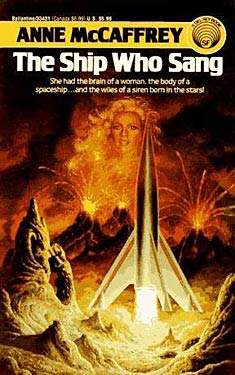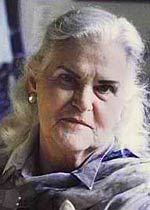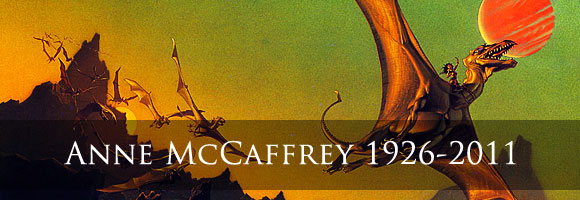GMRC Review: The Ship Who Sang
 Editor’s Note: Rhonda Knight is a frequent contributor to WWEnd through her excellent blog series Automata 101 and her new series Outside the Norm. It’s no surprise to us that Rhonda’s is the first featured review for the Grand Master Reading Challenge.
Editor’s Note: Rhonda Knight is a frequent contributor to WWEnd through her excellent blog series Automata 101 and her new series Outside the Norm. It’s no surprise to us that Rhonda’s is the first featured review for the Grand Master Reading Challenge.
 Anne McCaffrey’s The Ship Who Sang is a collection of six novelettes and novellas published between 1961 and 1969. Most of them stand alone but also work well as the continuous story of Helva, the ship who sang. McCaffrey creates a world in which humans have colonized other planets and have discovered many types of life forms “out there.” In this world, however, humans are still born with birth defects. These babies are tested for high levels of brain functions. If they do not pass the tests, they are euthanasized. If they do pass the test, their parents are given the choice between euthanasia or placing them in a school to learn to be the “brains” of a spaceship. These spaceships work for Cencom, delivering important cargo, transporting dignitaries, and other humanitarian or emergency jobs.
Anne McCaffrey’s The Ship Who Sang is a collection of six novelettes and novellas published between 1961 and 1969. Most of them stand alone but also work well as the continuous story of Helva, the ship who sang. McCaffrey creates a world in which humans have colonized other planets and have discovered many types of life forms “out there.” In this world, however, humans are still born with birth defects. These babies are tested for high levels of brain functions. If they do not pass the tests, they are euthanasized. If they do pass the test, their parents are given the choice between euthanasia or placing them in a school to learn to be the “brains” of a spaceship. These spaceships work for Cencom, delivering important cargo, transporting dignitaries, and other humanitarian or emergency jobs.
These babies are taken from their parents and entered into a school, where they are placed into smaller machine bodies and trained for their ultimate insertion into a ship. The children are given drugs to stunt their growth so that they may be permanently fitted into the control column of the ship. For Helva, the ship’s mobility is her mobility; its sensors are her senses. Her body is pumped nutrients, and she never sleeps. McCaffrey’s cyborg ship idea is fascinating, and she explores its potential in the first chapter. Readers learn more about Helva’s existence in the successive chapters.
The class of ship that Helva becomes is called a BB ship, signaling the two components, the brains, Helva and her ilk, and the brawns, the fully mobile human pilots who travel with the ships. The chapters explore Helva’s relationships with her brawns as she and they undertake the assignments given to them by Cencom. In my opinion, the first three chapters are the strongest narratives, both in their relation to one another and as independent stories.
 Reading this collection more than forty years after the individual parts were written, I can see how McCaffrey is working with early feminist ideas. Helva is strong, opinionated, and smarter than all of the men she encounters. She is able to choose her brawns, who must court her (McCaffrey’s term). She becomes financially independent in the course of the book, fights for her rights, makes choices that will ensure her growth and well-being. However, the weakness is that McCaffrey can’t quite break out of the idea that the brain-brawn relationship is a traditional concept of marriage. We see Helva fall in love with, break up with and enter into an “oil and water” relationship with various brawns. McCaffrey does not exactly force compulsory heterosexuality on Helva because she once has a female brawn (whom she often misses when the men seem incompatible to her).
Reading this collection more than forty years after the individual parts were written, I can see how McCaffrey is working with early feminist ideas. Helva is strong, opinionated, and smarter than all of the men she encounters. She is able to choose her brawns, who must court her (McCaffrey’s term). She becomes financially independent in the course of the book, fights for her rights, makes choices that will ensure her growth and well-being. However, the weakness is that McCaffrey can’t quite break out of the idea that the brain-brawn relationship is a traditional concept of marriage. We see Helva fall in love with, break up with and enter into an “oil and water” relationship with various brawns. McCaffrey does not exactly force compulsory heterosexuality on Helva because she once has a female brawn (whom she often misses when the men seem incompatible to her).
I applaud McCaffrey for what she was trying to do, but from my future perspective The Ship Who Sang is dated in the way it handles (and focuses on) relationships. I would like to see Helva using her brains to solve problems related to her assignments rather than worrying about her relationships with past, present, and future brawns. However, Helva is a fantastic feminist character and offers strong evidence against the critics who say that science fiction authors can’t create characters with depth.
Anne McCaffrey Rides Away at 85

 Anne McCaffrey, one of the most prolific writers in science fiction and fantasy, has died at age 85. She was one of the most celebrated and influential authors of her generation and has left behind an expansive body of work that amply demonstrates her mastery of her craft. Ms. McCaffrey was truly a master, garnering many awards and nominations for her short fiction and her novels. Her books have appeared on the ISFDB and NPR 100 Best SF/F lists, and were also recognized as Masterpieces by the Easton Press collection. Her early success in a male-dominated field earned her a spot on Ian Sales’ SF Mistressworks list, and David Brin included two of her books in his list of recommended young adult books.
Anne McCaffrey, one of the most prolific writers in science fiction and fantasy, has died at age 85. She was one of the most celebrated and influential authors of her generation and has left behind an expansive body of work that amply demonstrates her mastery of her craft. Ms. McCaffrey was truly a master, garnering many awards and nominations for her short fiction and her novels. Her books have appeared on the ISFDB and NPR 100 Best SF/F lists, and were also recognized as Masterpieces by the Easton Press collection. Her early success in a male-dominated field earned her a spot on Ian Sales’ SF Mistressworks list, and David Brin included two of her books in his list of recommended young adult books.
Here’s what other early eulogizers have said about her:
io9 highlights her personal favorite story:
"Besides the Pern books, McCaffrey wrote the classic space-faring novel The Ship Who Sang, in which a severely disabled girl becomes the core of a starship, or Brainship, with her mind controlling all its major functions. McCaffrey’s novel provided a startling new way to think about personhood and the nature of the mind/body connection, but also helped pave the way for a whole subgenre of posthuman space opera, in which heavily modified humans explore space."From Wired:
"McCaffrey helped pave the way for women writers in fantasy and science fiction, and was both the first woman awarded a Hugo Award and the first awarded a Nebula Award. Even in her 80s she continued to write, and over her lifetime produced a prodigious number of books and short stories. She was still answering readers’ mail on her website as of a few weeks ago."From Publisher’s Weekly:
"She introduced a generation of readers to both fantasy and science fiction, and was known for being gracious to her legions of fans. She will be greatly missed."
To my knowledge, there may be two books in her famous Pern series that have yet to be released. We are not yet done with Anne McCaffrey’s rich universe.



















 Full Details
Full Details

